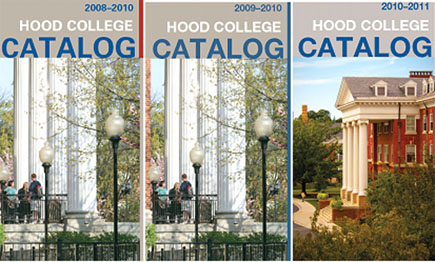
100 students at Hood College were asked if they agree with a first-year seminar. Of the students surveyed, there were 50 first-year's, 22 sophomores, 14 juniors, and 14 seniors.
Students who agree: 66
Students who disagree: 32
Students who are not sure: 2
Of the 50 first-year's who were asked:
Students who agree: 70 percent (35)
Students who disagree: 30 percent (15)

If you were to think of yourself as an incoming first-year student, do you think it would be beneficial to take a first-year seminar?
Hoffman, who is an advocate of the first-year seminar, believes that submitting a draft is important. “Not every re-write is an A paper, I think that is misunderstood by many. A paper that wasn’t well written and received a C could be re-written and receive a B. It went from an okay paper to a better paper, but it still could have been better,” she said.
Not all students oppose the first-year seminar however, as senior and chemistry major Jess Henry thinks the task force has it right. “When I came to Hood, it seemed like there was a disconnect for me when it came to writing and reading. Hopefully this would change that.”
The seminar would be capped at 12-15 students in order to have orderly discussion in the classroom. Topics for the seminar have been talked about, but have not been decided on. “The topics will come from the departments themselves. We need to offer 20-21 sections,” Hoffman said.
Sophomore Jennifer Bentz believes that a first-year seminar will attract more students as well. “Every school in the nation competes when it comes to finding the best,” she said. “But if we have a first-year seminar on zombies or something really cool, we might attract more qualified students.”
Trying to get the best students to come to Hood is always the main goal, but Provost Conway-Turner doesn’t believe that is the case with the first-year seminar. “The first-year seminar is to improve the reading and literacy and to have first-year’s relate with each other. We are actually behind in the process because our competitors are already doing it.”
Other colleges and universities that Hood compares themselves to are indeed ahead in having required first-year seminars. McDaniel College offered 31 sections of a first-year seminar for incoming freshman in 2010. According to the McDaniel website, it is “designed to ease students’ transition from high school to college [and to] promote cooperation among students and foster their intellectual development.” Mount St. Mary’s University and Gettysburg College have first-year seminars included in their core curriculum as well.
Provost Conway-Turner said that the task force has been in contact with other schools to see what has worked for them. “We don’t know what to do with honors students, whether they can exempt the first-year seminar or not, but we are leaning towards them being able to [exempt]” she said. “We don’t know what happens with transfer students that come in for their second semester.” Conway-Turner said that there is an implementation committee, and Hoffman is on a committee to discuss honors students.
Honors student and first-year Eliza Jacobs doesn’t understand why the first-year seminar would be implemented if all of the wrinkles aren’t ironed out, but believes “it would be beneficial to take a first-year seminar even though it would take more work on my end,” she said.
Hoffman is confident that the core will be passed, although she isn’t sure when. “It could come to the table as a vote at our next meeting on Nov. 11, but it could be tabled as well,” she said. If it is tabled, it would be up to the task force to fix anything that was pointed out to them during the meeting.
It has not been discussed if the general core and first-year seminar should be voted on separately. “If the core was defeated, then we would possibly take a look at that, because we really think the first-year seminar is vital to our incoming students,” Hoffman said. Junior Ethan Weidman believes that “in theory, the first-year seminar is fantastic,” but doesn’t see it moving as quickly as the rest of the core curriculum. “The rest of the core without the first-year seminar gives us an edge when it comes to respected liberal arts institutions…the first-year seminar is on too much of a fast track,” Weidman said.
Students aren’t sure if the benefits outweigh the risks in receiving a first-year seminar, but the decision is in the hands of the faculty when they decide on the proposed core curriculum in the near future.



